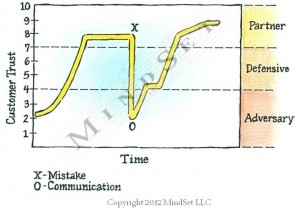Good leaders have a MindSet that sees the achievement of customer trust as a powerful harbinger of business success. Let’s examine how that goal is achieved and maintained.
When a business and a customer first begin to interact, a defensive (but usually not unpleasant) nature to the relationship usually exists, i.e., each wants to maximize their benefit from the interaction and it is usually assumed that whatever maximizes the benefit to one will come out of the hide of the other. The customer is going to be on guard to see that they are not taken advantage of, and this attitude will remain until they come to believe that the business they are dealing with is trustworthy. 
How can trust be built? We all know that trust must be built on a foundation of openness and integrity, yet small things also lend to the building of trust. Examples include greeting customers with genuine warmth (both in person and via phone), promptly responding to inquires, anticipating questions and concerns before the customer has to ask, exhibiting outstanding active listening skills, frequently checking customer satisfaction, and openly acknowledging mistakes.
One can envision customer trust on a 1 to 10 scale with 1 being mistrust and 10 total trust. A fundamental change in the nature of the relationship occurs somewhere around 7 on that scale. When we are able to get a customer’s trust at or above that level, there is a big payoff: the initially defensive and slightly adversarial nature of the relationship transforms to one where the customer becomes an active participant and partner in the business process.
One cautionary note: Hemmingway pointed out that the best way to find out if you can trust someone is to trust them. Let’s take his observation into the world of business. Should the customer ever believe that you have betrayed their trust (i.e., you had them at an 8 and then because of some event or misunderstanding it comes crashing down to a 3), you will have a new dynamic with which to deal. Now the customer will not only resort to a defensive posture with respect to your services, they will also have a fair dose of anger directed toward the company that betrayed their trust. This phenomenon is what makes it all the more important to quickly notify customers when problems arise…particularly when you were in error. Most people can accept that mistakes will occur, and the important element of trust can often be maintained despite mishaps if we act in an open, candid…well, trustworthy manner.

Founder of MindSet, LLC.

